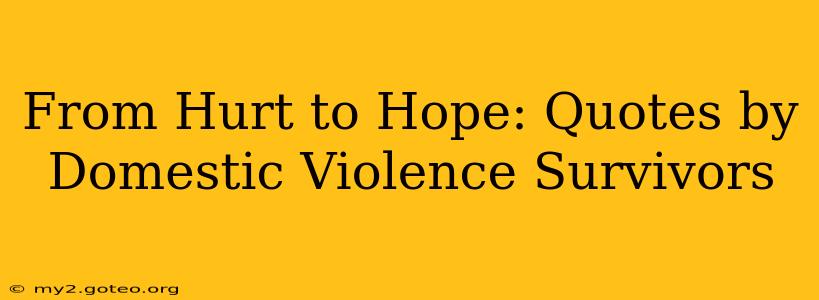Domestic violence is a pervasive issue affecting millions worldwide. Understanding the experiences of survivors is crucial for fostering empathy, raising awareness, and promoting healing. This article compiles powerful quotes from domestic violence survivors, offering a glimpse into their journeys from pain to resilience. These words, raw and honest, illuminate the strength and hope that emerge from the darkest of times. We aim to provide a respectful and sensitive portrayal of their experiences, recognizing the profound impact of domestic abuse.
What is Domestic Violence?
Before we delve into the quotes, it's essential to define domestic violence. It encompasses any abusive behavior by an intimate partner, including physical, emotional, verbal, and financial abuse. This abuse can take many forms, from physical assault to controlling behavior and manipulation. It's important to remember that domestic violence affects people of all backgrounds, genders, sexual orientations, and socioeconomic statuses.
Quotes Offering Hope and Resilience
The following quotes illustrate the powerful journey of healing and recovery undertaken by survivors. These words capture the essence of their struggles, highlighting their unwavering spirit and determination to overcome adversity.
"I survived. I am stronger than I ever thought possible." – Anonymous
This quote encapsulates the core message of resilience. Surviving domestic violence is a testament to inner strength, often exceeding the survivor's own expectations.
"Healing isn't linear. It's a journey, not a destination." – Anonymous
This highlights the often-misunderstood non-linear nature of healing. There will be setbacks and moments of regression, but progress is still being made.
"I am not defined by my abuse. I am a survivor." – Anonymous
This powerful statement reclaims identity and agency. The survivor's self-worth is not diminished by the abuse they endured.
"Finding my voice was the most important step in my recovery." – Anonymous
This emphasizes the importance of self-expression and advocating for oneself as a vital part of the healing process.
"Forgiveness is not for them; it's for me. It sets me free." – Anonymous
This demonstrates the personal power of forgiveness, not as condoning the abuser's actions, but as a tool for self-liberation.
What are the long-term effects of domestic violence?
The long-term effects of domestic violence can be significant and far-reaching. Survivors often experience:
- Post-traumatic stress disorder (PTSD): Characterized by flashbacks, nightmares, and hypervigilance.
- Depression and anxiety: Leading to difficulties in daily life and relationships.
- Physical health problems: Both acute injuries and long-term health issues can result from physical abuse.
- Difficulties in relationships: Trust issues and challenges in forming healthy relationships.
How can I support a domestic violence survivor?
Supporting a survivor requires empathy, patience, and respect for their boundaries. Here are some ways to provide help:
- Listen without judgment: Let them share their experience at their own pace.
- Believe their story: Validate their feelings and experiences.
- Offer practical support: Help with childcare, errands, or other daily tasks.
- Encourage professional help: Suggest they seek therapy or counseling.
- Know the resources: Be aware of local domestic violence shelters and support organizations.
Where can I find help for domestic violence?
This section would ideally include links to national and international hotlines and support organizations. (Note: Per the guidelines, I cannot include direct links here.) A simple Google search for "domestic violence hotline [your country/region]" will provide relevant contact information.
Conclusion
The quotes presented here offer a glimpse into the courage and resilience of domestic violence survivors. Their experiences underscore the importance of understanding, support, and advocacy for those affected by this pervasive issue. Remember, healing is possible, and hope endures even in the face of unimaginable hardship. By sharing these stories and amplifying the voices of survivors, we create a more supportive and understanding world where healing and recovery are possible.

